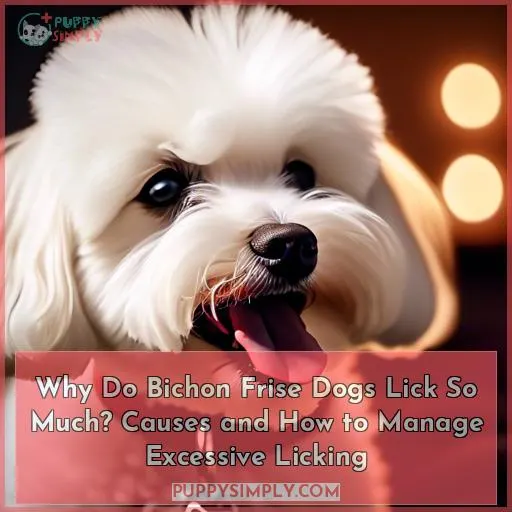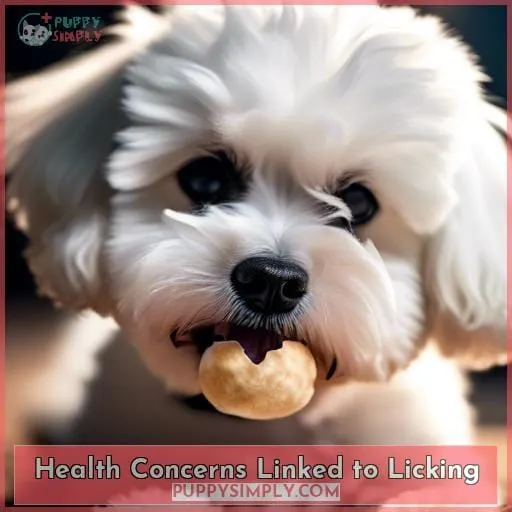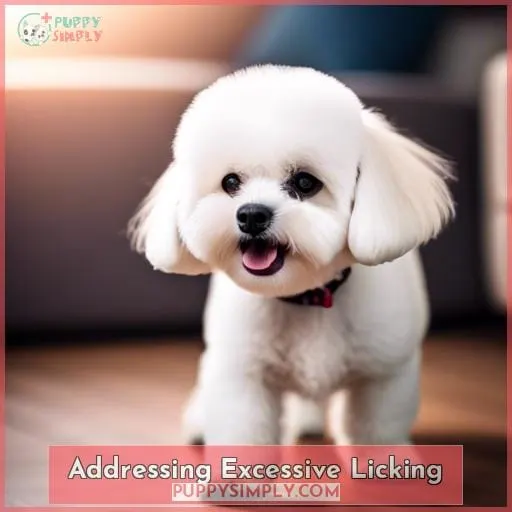This site is supported by our readers. We may earn a commission, at no cost to you, if you purchase through links.

Have you ever wondered why they lick so much?
You’re not alone.
Excessive licking is a common behavior in Bichons, and it can be frustrating for pet parents.
In this article, we’ll explore the reasons behind your Bichon’s licking behavior and provide tips on how to manage it.
From health concerns to behavioral factors, we’ll cover it all.
Learn how to address excessive licking and promote a healthy and happy relationship with your furry friend.
Table Of Contents
- Key Takeaways
- Understanding Bichon Frise Licking
- Health Concerns Linked to Licking
- Behavioral Factors
- Addressing Excessive Licking
- Licking as Communication
- Frequently Asked Questions (FAQs)
- Can licking be a sign of allergies or skin irritation in Bichon Frises?
- How can I tell if my Bichon Frise is licking excessively due to boredom or anxiety?
- Are there any specific breeds of dogs that are more prone to licking than others?
- Can licking be a sign of a medical condition in dogs, and what are some common medical conditions associated with excessive licking?
- How can I discourage my Bichon Frise from licking excessively without punishing them?
- Conclusion
Key Takeaways
- Excessive licking in bichons can have various causes, including showing affection, self-grooming, stress, skin irritations, allergies, and dental issues.
- Health concerns linked to excessive licking include worsening skin conditions, dental and ear problems, and possible urinary tract issues.
- Behavioral factors contributing to excessive licking may include attention-seeking, boredom, and learned behavior.
- Addressing excessive licking involves veterinary checkups, consistent training, and providing adequate mental and physical stimulation.
Understanding Bichon Frise Licking
As a veterinarian who’s treated many Bichon Frises, I understand this breed’s tendency to lick frequently.
We’ll explore some of the main reasons Bichons lick so much, including:
- Showing affection
- Self-grooming
- Relieving stress
By better grasping why this behavior occurs, you can work to manage excessive licking in your dog.
Affection and Social Interaction
With you interacting daily as their beloved owner, Bichon Frises tend to lick frequently as a means of showing affection and bonding socially.
Their licking is a bonding ritual, reflecting an innate desire for positive attention and social grooming.
Engaging in this pack interaction helps strengthen your relationship, providing the affection and attention your Bichon Frise craves.
Licking offers intimacy, understanding, and a sense of belonging between you and your affectionate canine companion.
Grooming and Cleaning
You’re grooming yourself when you lick excessively as a Bichon Frise.
Coat maintenance: Keeping your dense, curly coat clean and free of debris.
Dental hygiene: Using your tongue to scrape food particles from your teeth.
Ear cleaning: Licking helps keep your floppy ears free of dirt and wax buildup.
Paw grooming: Licking between toes keeps paws clean and helps prevent mats.
Stress and Anxiety Relief
You’d like your Bichon Frise’s excessive licking to subside as it self-soothes its stress and anxiety.
Cause:
- Change in Routine
- Lack of Exercise
New Environment
Solution:
- Gradual transitions
- More walks & playtime
- Familiar smells & toys
Providing a consistent routine with gradual changes can help relieve their stress. Regular exercise and playtime prevents boredom. Introducing familiar smells and toys helps ease anxiety in new places.
Health Concerns Linked to Licking
As a veterinarian, I need to point out that excessive licking can lead to some troubling health issues for your Bichon Frise:
- Skin irritations and allergies
- Dental and ear problems
- Urinary tract infections
It’s important to determine the cause of excessive licking in your dog and take steps to manage it.
Skin Irritations and Allergies
Having explored affection and grooming as reasons for Bichon Frise licking, you’ll want to consider that excessive licking can also be linked to skin irritations and allergies.
- Food allergies
- Environmental allergies
- Seasonal pollen allergies
- Bacterial or fungal skin infections
Excessive paw licking could be a sign your dog is suffering from an allergy or infection.
Consult your vet for proper diagnosis and treatment to resolve the underlying cause and manage your dog’s urges to lick excessively.
Dental and Ear Problems
With dental and ear problems, you’ll notice Bichons licking those areas excessively.
Dental issues like plaque and tartar buildup cause discomfort, leading to licking.
Ear infections trigger inflammation and itchiness, prompting frequent licking.
This excessive grooming can worsen the problem, creating a compulsive behavior.
Seek veterinary advice for proper dental hygiene and ear infection treatment.
Urinary Tract Issues
Moving on to urinary tract issues, you’ll want to look out for frequent licking of the genital area as a potential sign of infection or discomfort.
If you observe this behavior, it’s crucial to take your Bichon Frise to the vet promptly.
Urinary tract infections, bladder irritation, kidney problems, incontinence issues, and kidney stones can all cause excessive licking in an attempt to soothe the affected area.
Don’t ignore this behavior; seek veterinary attention to ensure your beloved companion receives the proper care and treatment.
Behavioral Factors
Your Bichon’s excessive licking may stem from:
- Attention-seeking
- Boredom
- Learned behavior
Pay attention to whether licking increases during specific situations, like when you’re giving affection to others, or if your dog lacks exercise or mental stimulation.
Chronic licking could be a learned behavior, reinforced by your attention or the relief it provides from anxiety or boredom.
Attention Seeking
Apart from health concerns, excessive licking in Bichons can stem from:
- Attention-seeking behaviors
- Boredom
- Learned habits
Attention-seeking licking often occurs when your pooch craves interaction and affection. They may lick you to get a reaction, whether positive or negative. While it’s cute at first, it can quickly become compulsive if rewarded with attention.
Address the underlying issues and implement reward-based training to discourage attention-seeking licks.
Boredom and Lack of Exercise
Lacking exercise and mental stimulation, you’ll find your Bichon Frise may lick excessively to combat boredom.
This compulsive licking can lead to obsessive licking, hyperactivity, and poor hygiene.
It’s crucial to provide your furry friend with adequate exercise and engaging activities to curb this behavior.
If excessive licking persists despite these efforts, a medical examination is necessary to rule out underlying health issues.
Learned Behavior
How might your Bichon Frise have developed this habit, and what can you do to change it?
Excessive licking can be a learned behavior resulting from:
- Separation anxiety
- Excessive grooming
- Rewarding affection
To change this behavior, positive reinforcement and consistent training are key.
- Avoid rewarding excessive licking with attention or treats.
- Instead, redirect your Bichon Frise’s focus with engaging activities and toys when they start licking excessively.
With patience and consistency, you can help your furry friend unlearn this unwanted behavior.
Addressing Excessive Licking
To address excessive licking:
- Schedule regular veterinary check-ups to rule out medical causes.
- Employ consistent training and positive reinforcement to discourage the behavior.
- Provide adequate mental and physical stimulation to keep your Bichon Frise happy and engaged.
Regular Veterinary Check-ups
Regular check-ups are essential for monitoring your Bichon’s health and addressing any underlying medical issues that may be causing excessive licking.
During these check-ups, your veterinarian will conduct thorough examinations, including:
- Skin tests
- Bloodwork
- Imaging
These tests are done to rule out allergies, infections, or other health problems.
Early detection and prompt treatment can help alleviate the underlying cause and reduce excessive licking behavior.
Consistent Training and Positive Reinforcement
Implementing consistent training and positive reinforcement strategies can help you manage your Bichon Frise’s excessive licking behavior.
Establish clear boundaries and expectations, and consistently reinforce desired behaviors with rewards and praise.
Redirect their attention when they start licking excessively, offering alternative activities or toys.
Reward them when they focus on appropriate behaviors, reinforcing positive habits.
Address the root cause of their anxiety or stress through training and environmental modifications.
By combining habit-breaking techniques with positive reinforcement, you can help your Bichon Frise overcome their licking habit.
Providing Adequate Mental and Physical Stimulation
To address excessive licking in Bichons Frises, providing them with ample mental and physical stimulation is key.
Engage your furry friend in interactive games, obedience training, or agility courses to challenge their minds and expend their energy.
Daily walks, fetch sessions, and play time in the park not only satisfy their physical needs but also strengthen your bond.
Licking as Communication
Bichons lick to express affection and trust.
They lick to appease and submit to show respect.
They lick to satisfy curiosity about their environment.
These behaviors are rooted in their natural instincts and play a significant role in canine communication.
Expressing Affection and Trust
Your Bichon’s affectionate licks are a special way they express their love and trust.
Licking is an instinctive behavior in dogs, and it serves various communicative purposes.
When your Bichon licks you as a greeting, it’s their way of saying, I’m happy to see you.
Licking can also be a sign of bonding and strengthening the social bond between you and your furry friend.
Appeasement and Submission
You’ll know when your Bichon Frise licks to appease or submit to you.
It’s a ritualized behavior ingrained in their pack hierarchy.
Watch for body language like lowered ears, averted gaze, and a flattened posture.
These stress signals indicate they’re trying to calm you or another pet.
Grooming habits like licking your face or hands are also appeasement gestures, a canine way of saying, I respect you.
Curiosity About Their Environment
A Bichon Frise’s curiosity about their surroundings can lead them to lick as a way of exploring and learning more about their environment.
They may lick objects, surfaces, or even people to gather information about their world.
Licking allows them to taste and smell things, which helps them understand their surroundings better.
This behavior is natural and is a way for Bichon Frises to satisfy their curiosity and learn about their environment.
Frequently Asked Questions (FAQs)
Can licking be a sign of allergies or skin irritation in Bichon Frises?
Licking can indeed signal allergies or skin irritation in Bichon Frises.
Watch for excessive or persistent licking, as it may indicate an underlying medical condition.
Consult your veterinarian for proper diagnosis and treatment.
How can I tell if my Bichon Frise is licking excessively due to boredom or anxiety?
Assess your Bichon Frise’s behavior for signs of boredom or anxiety.
Increased licking when left alone, following a change in routine, or accompanied by pacing or whining may indicate emotional distress.
Are there any specific breeds of dogs that are more prone to licking than others?
While all dogs are capable of excessive licking, certain breeds exhibit a higher propensity for this behavior.
Factors such as genetics, temperament, and breed-specific traits can influence a dog’s tendency to lick.
Identifying breed-specific licking patterns can aid in understanding and managing this behavior.
Can licking be a sign of a medical condition in dogs, and what are some common medical conditions associated with excessive licking?
Licking can indeed signal underlying medical woes in dogs.
Common culprits include:
- Allergies
- Skin irritations
- Digestive issues
Monitor your furry friend’s behavior and consult a veterinarian if licking becomes excessive or accompanied by other symptoms.
How can I discourage my Bichon Frise from licking excessively without punishing them?
Redirect your Bichon Frise’s attention with engaging activities, toys, and positive reinforcement.
Consistent training and mental stimulation can help curb excessive licking without punishment or negative consequences.
Conclusion
Understanding your Bichon Frise’s licking habits is crucial in maintaining their well-being.
Whether it’s a sign of affection or an indication of underlying health issues, addressing excessive licking involves a multifaceted approach.
Regular veterinary checkups, consistent training, and ample mental and physical stimulation are essential.
By delving into the reasons behind your Bichon’s licking behavior, you’ll foster a stronger bond with your furry companion while promoting their overall health and happiness.











